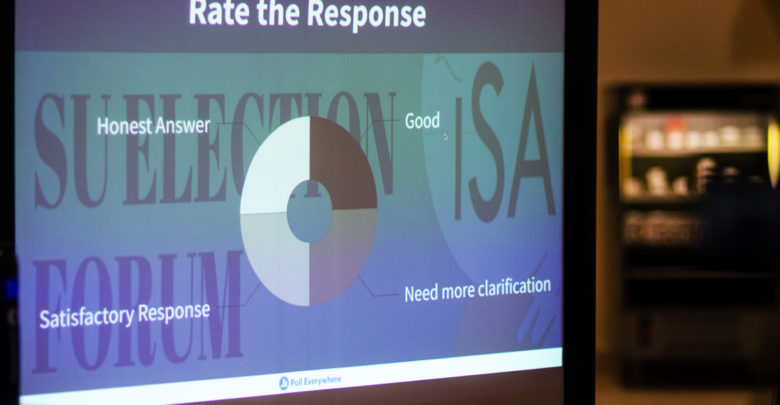Live polls have potential, but are too uncertain to use in elections
While live polls could be a fun, interactive way for students to engage with candidates, they are currently too fraught with issues to be used
 Helen Zhang
Helen ZhangAt the last forum of the 2020 Students’ Union elections, hosted by the International Students’ Association (ISA), moderators presented the audience with a new way to engage with SU candidates: live polls during the Q&A portion of the forum. The system allowed for audience members to comment on the answers of candidates in real time, giving students the option to vote for whether an answer was “honest,” “good,” “satisfactory,” or if it needed “more clarification.” The answers of the poll would then be shown on a screen beside the candidates, highlighting the relative strength or weakness of their answer.
While the system itself could’ve been a fresh and exciting opportunity for students to engage with the candidates, the live polls were spoiled by uncertainty. The result was a system open for campaigns to manipulate, leaving students with potentially misleading conceptions of how candidates performed.
This risk is primarily the result of campaign volunteers in the audience, who are there to support their candidate, and potentially attempt to aid them through a variety of tactics. Examples of this include loudly clapping and cheering for your candidate while remaining silent for their opponent, as well as asking multiple questions for their candidate to answer at forums.
The element of live polling, however, presents a new way for campaigns to aid candidates: flooding the poll results. By voting in favour of your candidate, regardless of the substance of their answer, you can ensure that the screen beside them leads the audience to believe that their response was “good” or “honest.” The potential for this tactic was even emphasized by Rowan Ley, a candidate for vice-president (external), who asked during the forum that those affiliated with campaigns refrain from voting in the poll. Overall, the poll presented a dangerous potential for campaigns to manipulate the results in favour of their own candidate.
Beyond supporting their candidate, campaigns could additionally target their opponents by voting that their answers needed “clarification,” even if the candidate hadn’t completed their response. While it is unclear whether this happened at the ISA forum, there were a number of times where, mere seconds into a response, the live poll would call for “more clarification” or immediately label a response as “good.” This means that, at the very least, there was a substantial degree of intellectual dishonesty in the answers given to live polls.
The potential sway of campaigns was furthered by design flaws in the poll itself, which allowed for participants to vote more than once. Testing the poll out after the conclusion of the forum, I was able to repeatedly vote for one response, up to a maximum of 40 times. Obviously, this is a major flaw within the poll itself, allowing for disproportionate amounts of influence amongst audience members. This could’ve been solved by having participants provide their UAlberta email prior to responding.
While I cannot be certain of the extent to which campaigns actually influenced poll results, this flaw alone should have removed these polls from serious consideration. Instead, the results were proudly displayed on a screen beside the candidates, to the detriment of audience members who may not be aware of how vulnerable these results were to unfair influence.
Overall, live-polling could present a great way for students to engage in forums. However, when the polls are done in a way that leaves them open to manipulation by campaigns and other audience members, this only does a disservice to students who come out to forums in the first place.




